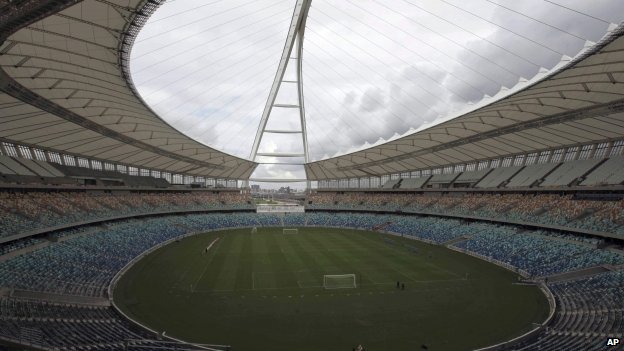 The 2010 World Cup was a great advert for South Africa
The 2010 World Cup was a great advert for South Africa.jpg)
The games have never been hosted on African soil even though the majority of Commonwealth members are African.
And that’s not all.
We are not building Olympic-size venues so we are not going to be left with white elephants”
David Isaacson Times Media Group
South Africa is using the Commonwealth Games as a dry run for a bid to host the Olympic Games, which have also never been held on African soil.
“The Olympics will be the next big thing in South Africa – this is the foundation,” said flamboyant Sports Minister Fikile Mbalula at the official ceremony where the bid was submitted.
However, he did not give a timeframe.
The Durban bid committee said the games would generate about $2bn (£1.3bn) for the city, the largest in South Africa’s KwaZulu-Natal province.
Bid committee chairman Mark Alexander is confident that the spin-off will be massive, especially in transport, improved housing, job creation and so on.
The committee said it expects the games to create at least 12,000 jobs.
Moses MabhidaOne doesn’t need to be a rocket scientist to figure out that Durban is hoping to use the 2010 World Cup infrastructure to host the games.
 The Moses Mabhida stadium will host the Commonwealth Games
The Moses Mabhida stadium will host the Commonwealth GamesThe Moses Mabhida stadium will loom large. It is a visually striking structure on the edge of the Indian Ocean, designed like a giant African basket and is a tourist attraction in its own right.
Its normal capacity of 54,000 can be extended to 86,000 by using foldable seats.
The stadium is named after a hero of the anti-apartheid struggle who died in exile.
There are many people, like myself, who believe that Africa is ready to host the games and has been for a very long time – both Commonwealth and the Olympics, which would be far more demanding in size and scale.
David Isaacson who writes on the Commonwealth games for the Times Media Group in Johannesburg said: “There have been 20 Commonwealth Games and New Zealand, Australia, Britain and Canada have hosted multiple times each and there’s been three out of that total hosted outside those four countries.”
He continued: “We are not building Olympic-size venues so we are not going to be left with white elephants.”
Financial returns?However, there are others who feel that these massive sporting events are money-making schemes for international groups and generally do not benefit locals.
The sceptics point to the 2010 World Cup promises which did not filter down to the common man in the street.
 Africa has won many Commonwealth golds but never hosted the games
Africa has won many Commonwealth golds but never hosted the gamesSouth Africa spent $2bn (£1.2bn) on infrastructure but may not have fully recovered its investment.
The organisers said that it was not about instant financial returns. It was about repositioning the country globally and the effects will be felt many years from the final.
Some South Africans are indifferent to the whole thing.
They have become accustomed to hosting global sporting events.
They tell me that we had the Rugby World Cup in 1995, won by the Springboks in a Mandela magic moment, the 1996 Africa Cup of Nations which the host nation also won, the Cricket World Cup in 2003 and others including, of course, the mother of them all, the 2010 World Cup.
The country has successfully hosted numerous non-sporting global events too.
The 15th Commonwealth Heads of Government Meeting (CHGM) in 1999, incidentally, was also hosted in Durban, while the World Summit on Sustainable Development or Rio plus Ten in 2002 on Climate Change took place in Johannesburg.
In any case, South Africans are confident they can host these meetings.
It is a shame that the world is always doubtful about Africa, even when the evidence is there for all to see.
FRENCH VERSION


